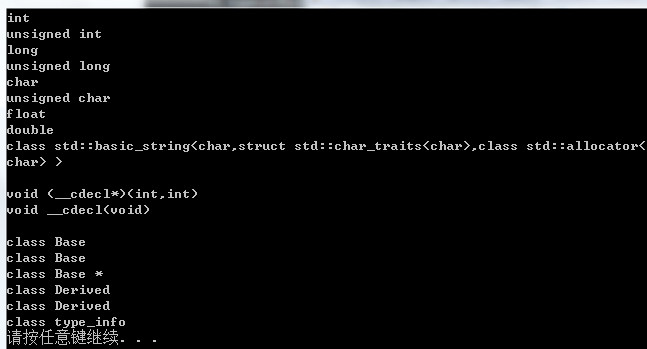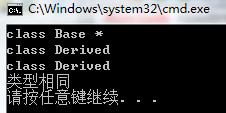dynamic_cast:将基类类型的指针向派生类指针安全转换。多用于下行转换。上行转换时,和static_cast是一样的。C++类型转换看这里。而const_cast用来修改类型的const或volatile属性。。。下面主要说多态下的RTTI:
使用条件:
基类应有虚函数。
编译器需启用Runtime Type Information/Identification(RTTI),运行时类型信息。VS下在项目属性页下启用,如下,选 是: (VS2013测试:默认的留空不选也能正常使用dynamic_cast)
结果:
对指针进行dynamic_cast,失败返回null,成功返回正常cast后的对象指针; //首选
对引用进行dynamic_cast,失败抛出一个异常std::bad_cast,成功返回正常cast后的对象引用。
用处:一般用在多态中,即基类的指针或引用指向派生类对象时,进行安全的向下转换。
多态的基本例子如下:

#include <iostream> using namespace std; class Base { public: virtual void vFoo() { cout << "Base::vFoo()" << endl; } virtual ~Base(){ } }; class Derived : public Base { public: virtual void vFoo() { cout << "Derived::vFoo()" << endl; } void Other() { cout << "Derived::Other()" << endl; } virtual ~Derived(){ } }; int main() { Base *pBase = new Derived; pBase->vFoo(); //"Derived::vFoo()" delete pBase; return 0; }
可看到,由于基类指针实际指向派生类实例,所以实际调用的是派生类里的vFoo()函数。
但尝试 pBase->Other();//编译出错 ,虽然pBase指向派生类实例,但指针本身的类型却决定了它所能调用的函数范围。
强制转换下呢: ((Derived*)pBase)->Other();//"Derived::Other()" ,成功了。
但如果这样呢:
Base *pBase = new Base; ((Derived*)pBase)->Other();
仍然成功了,正确输出。实际Other函数可以直接使用Derived::Other()来调用的,因为函数里没交互数据成员。但如果交互了呢:
//Derived类里: public: int a = 6;//C++11 void Other() { cout << a << endl;//随机数字,如73756547 a = 100; } }; //main里 Base *pBase = new Base; ((Derived*)pBase)->Other();
运行后竟仍然成功了。但从输出的a是随机数字可以看出int a =6;并没有执行过,因为new的是Base实例。这里我们虽依然运行成功,但从程序上看,这是不对的。如果Derived类封装的更复杂(比如在构造函数里new, Other里delete),可能肯定运行时会崩溃!所以c语言形式的强制转换在此种情况下是不安全的。
可能问,为什么一定要调用Other函数呢,如果一定要在使用多态时调用它,在基类里添加Other函数并声明它为虚函数不就行了。是的,这样可以。但有时,比如我使用了一个第三方库(封装到lib里,只提供了它的头文件),我在从它继承的派生类中添加了新函数,并想在多态下使用。此时是不可能在第三方库里添加虚函数的,因为库不能重新编译。这时就需要安全的类型转换了。dynamic_cast就可以在此种情况下起作用:
void foo(Base *p) { Derived* pChild = dynamic_cast<Derived*>(p); if(pChild) pChild->Other(); else { //不指向派生类实例时的处理 } } //引用时 void foo2(Base &b) { try { Derived& pChild = dynamic_cast<Derived&>(b); pChild.Other(); } catch(std::bad_cast) { //不指向派生类实例时的处理 } }
对基类指针,不属于某个派生类实例将返回null,这样可用来判断类型:
void foo(Base *p) { if(dynamic_cast<Derived1*>(p)) { //属于Derived1类 } else if(dynamic_cast<Derived2*>(p)) { //属于Derived2类 } //... }
typeid:
http://www.cppblog.com/smagle/archive/2010/05/14/115286.aspx这篇写的很好,我就不怎么写了。。。直接贴它的几个例子吧
需要注意(仍根据上文例子):
Base *pBase = new Derived;
cout << typeid(pBase).name() << endl; //class Base* 虽然基类有虚函数且指针指向派生类对象,但仍输出指针类型本身
cout << typeid(*pBase).name() << endl;//class Derived
Base &rD = *pBase;//class Derived //注意,引用和指针结果不同
//所以typeid能对含虚函数的类类型(对象本身或引用)判断出其指向的对象的类型信息,对指针无用。
例子:

#include <iostream> using namespace std; class Base { }; class Derived: public Base { }; void foo() { } int main() { Base b, *pb; pb = NULL; Derived d; cout << typeid(int).name() << endl << typeid(unsigned).name() << endl << typeid(long).name() << endl << typeid(unsigned long).name() << endl << typeid(char).name() << endl << typeid(unsigned char).name() << endl << typeid(float).name() << endl << typeid(double).name() << endl << typeid(string).name() << endl << endl //函数类型和函数指针也可以 << typeid(void (*)(int, int)).name() << endl << typeid(foo).name() << endl << endl << typeid(Base).name() << endl << typeid(b).name()<<endl << typeid(pb).name()<<endl //虽然指向NULL,但本身类型是Base * << typeid(Derived).name() << endl << typeid(d).name()<<endl << typeid(type_info).name() << endl; return 0; }

#include <iostream> using namespace std; class Base { public: virtual void foo(){} virtual ~Base(){} }; class Derived: public Base { }; int main() { Base *pd = new Derived; cout << typeid(pd).name() << endl //class Base * << typeid(*pd).name() << endl; Base &rD = *pd; cout << typeid(rD).name() << endl; //虽无法从指针本身上判断,但可对其解引用 if(typeid(Derived) == typeid(*pd)) cout << "类型相同" << endl; else cout << "类型不同" << endl; delete pd; return 0; }

